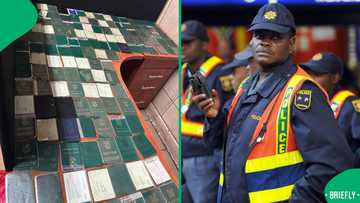Con Court Rules Prisoners Have Right to Use Personal Computers in Cells for Education
- Prisoners who study are now allowed to use computers in their prison cells for educational purposes
- The Constitutional Court said that the prohibition of personal computers in inmates’ cells infringes on their right to education
- Inmates are, therefore, unable to complete tasks and access educational readings while they are in their cells
PAY ATTENTION: You can now search for all your favourite news and topics on Briefly News.
On Wednesday, 30 April 2025, the Constitutional Court declared prohibiting prisoners from using personal computers in their cells unconstitutional. It held that the barring was an infringement on the inmates' right to education.

Source: Getty Images
What did the Constitutional Court say?
The court said that the ban disadvantages inmates, as they cannot access educational reading materials and complete their required tasks when they are in their cells. The court ruled that any inmate who is registered at a tertiary or recognised further educational institution and needs a computer to support their studies is entitled to use their personal computer in their cells. The inmates may not use an internet modem.

Read also
11 classrooms destroyed in fire at Riverlea High School, South Africans suspect tenders are incoming
Inmates are required to make their personal computers available for inspection at any time. If an inmate is found in breach of any rule, the head of a correctional centre may ban the inmate from using the computer in their cells.
PAY ATTENTION: stay informed and follow us on Google News!
The court also ordered that the National Commissioner of Correctional Services revise its policy and that the constitutional invalidity be suspended for a year.
The initial policy challenge
The ban on the use of personal computers emanates from a departmental policy that was approved in 2007. It was challenged by Mbalenhle Sydney Ntuli, an inmate who was serving a 20-year sentence at the Johannesburg correctional centre. He was a registered computer studies student at Oxbridge Academy.
Ntuli complained that he was unable to complete his work because he was not allowed to use the computer in his cell. After he was moved from Medium B to Medium C, he was not allowed to use his laptop and had to use the computer room. The computer room was only open during certain hours, and sometimes on weekends.

Read also
Tembisa Man arrested for manufacturing fraudulent documents, found with IDs and driver's licences
High Court ruling
The High Court in Johannesburg ruled the barring invalid. The Minister of Correctional Services appealed to the Supreme Court of Appeal, but the court agreed that the policy was an infringement on the inmates' right to education.
On Wednesday, Justice Stevan Mjiedt said that the ruling only focused on the rights of prisoners to personal computers for educational purposes. He said that the state must remove barriers to education and that the ban on the use of personal computers in cells limits that right.

Source: Getty Images
Netizens weigh in
South Africans shared their opinions on social media regarding the ruling by the Constitutional Court.
@LibertarianZA said:
"Will they be physically disabled from connecting to any network, though? Otherwise, this is a very bad idea."
@NadiaFerreira85 said:
"Next there'll be a law that the State has to provide laptops and cellphones."
@camjongun14236 said:
"More rights than school children."

Read also
South Africa’s only licence card printer out of order since January, SA describes it as incompetence
@GetrudeM said:
"More education rights to criminals while law-abiding youngsters can't access higher education and funding."
@artificialinfo1 said:
"Insted of creating a centralised area inside the prison for the inmates to study and have better control. I will never understand this countries law system. The criminal is treated as royalty."
@thibo_thash4u said:
"That's the best constitution for you, even our police officers self can no longer do their work effectively because it favours a perpetrator than anyone else."
@ernestseretse said:
"Just recently they were complaining that they have less chicken and beef in meals. Now they need laptops."
@_thabang_m said:
"This Constitution punishes the police when they do their job and coddles convicted criminals. Very progressive."
What you need to know about prisoners in SA
- South Africa's matriculant prisoners achieved a 96.2% pass rate in the National Senior Certificate examinations.
- A student at Usethubeni Youth School became a top academic performer after writing his matric exams while in prison.
- Inmates who wrote the 2023 matric exams in South African correctional centres are celebrating a remarkable 93.2% pass rate.
- Minister of Justice and Correctional Services Ronald Lamola recently announced that 87.5% of the inmates who took the 2022 matric exams passed.

Read also
Enoch Godongwana scraps proposed VAT hike, SA suggests how government can negate expected shortfall
Mangaung Correctional Centre wardens apply for bail
In another story, Briefly News reported that four wardens from the Mangaung Correctional Centre are set to apply for bail on 25 April 2025.
The four G4S employees are accused of murder and defeating the ends of justice after the death of an inmate. This comes after a prisoner was beaten and pepper-sprayed during an unauthorised raid in his prison cell.
PAY ATTENTION: Follow Briefly News on Twitter and never miss the hottest topics! Find us at @brieflyza!
Source: Briefly News

